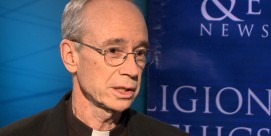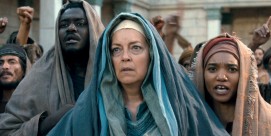In This Episode << SLIDE LEFT TO SEE ADDITIONAL SEGMENTS
Frederick Buechner Extended Interview
Following is more of Kim Lawton’s interview with writer and minister Frederick Buechner:
On Palm Sunday:
I looked back at the account in Luke of Palm Sunday. It’s only there you find it where Jesus, as he approaches the city, looks at it and weeps. Except for the weeping over Lazarus, I don’t know anyplace else in the New Testament where he is shown as weeping. And he weeps because he says, “Jerusalem, if only you knew the things that make for peace.” And he says, “The time is not far off when your enemies will set an encampment against you, and they will dash you against the rocks and your little ones with you and leave not one stone upon the other, because you did not know the time of God’s coming to you.”

“Would that you knew the things that make for peace.” He could be saying that just as easily today — would that the world, the United States, knew the things that make for peace. In a way they do, but they don’t somehow live out of those things; they live out of other things, antagonisms and fears and aggressiveness and things of that kind. I thought a lot about Jesus’ tears for Jerusalem, how he would be weeping still, again, today for the same reason: “Would that they knew the things that make for peace.”
It was a pathetic little procession. I think if you had been there, it wouldn’t have amounted to much — somebody from nowhere riding on a donkey into a city. No television cameras, no hoopla, no band. But nonetheless, as his life went, it was his moment of triumph, and people hailed him as the Son of David and [said], “Blessed is he that comes in the name of the Lord.” Yet people are so fickle, as has often been pointed out. Within a week or less than a week of that, they were saying, “Crucify him.”
I can’t help thinking of the stories one hears out of Iraq about the Iraqis running out and embracing American soldiers and giving them flowers. But three weeks from yesterday, who knows what they’ll be doing — shooting at them from windows as we will be shooting at them. Because the world is mad. It’s always been mad — never known the things that make for peace, never acted out of them … or rarely.
On the crucifixion:
There was the crucifixion, this hideous death of this good man with God absent, as far as one can tell. And in the garden, Jesus says, “Would this cup could pass from me,” and sweats blood. “Nonetheless, not my will, but yours be done.” And there’s no indication that God said a bloody thing.
And then again on the cross, that terrible cry: “Why have you let me down? Why have you abandoned me?” And again, no answer. God is either absent or, at least, he is not in evidence, apparently to Jesus or to anybody else. Out of this hideous death and out of this almost more hideous feeling one has that here was this good man, not only being tortured to death but also abandoned by the God for whom, in a way, he was dying — out of this, nonetheless, comes whatever on earth it was that happened two days after the crucifixion, which we use the word “resurrection” for. What happened? Who knows? And in a way, almost, who cares? Because even if somebody had been there with a television camera and taken a picture of Jesus walking out of the tomb, what would that be except, for many people, an interesting historical fact, just as it’s interesting to know that Columbus sailed the ocean blue in 1492? But what difference does that make to me? So what if a Jew in the year 30 A.D. was brought back from the dead? In other words, what’s important is not so much what happened in the half-light of daybreak on that day in 30 A.D., but what happens now. What matters is not what happened on Easter Sunday, but what happens in my life. Is there any sense that, for you and for me, Jesus exists, or the power that was in Jesus, the power that led people to see him as kind of transparency to holiness itself, to the mystery itself? If that is alive, that’s all that matters, and what happened on that day is of little consequence except in a minor historical way.
On the role of suffering in the life of faith:
Which of us has not suffered one way or another? We’ve all had our crucifixions, where God seems to be absent and light seems to disappear, and the world is dark and terrifying. Anybody with faith or without faith has had somehow to live through that kind of a time. The question is, What comes out of that time?
Suffering plays a role in every life. We’ve all known our dark times; we’ve all felt abandoned by God or felt there was no such thing as God to abandon us — just the emptiness, the craziness of the world. And out of this, faith can often come. In my own life, I’ve never gone through a dark time without eventually somewhere finding a treasure in it — maybe luck, maybe grace, maybe who knows what. But there are others, of course, for whom suffering somehow becomes the executioner, where the suffering is so pervasive and intense and unanswerable that somehow any possibility of faith seems to be destroyed by it. So who knows the role of suffering? We all experience it; some come out of it with a kind of faith in spite of that. The only story we really can tell is our own story. I don’t know about the story of people who have grown up in hopeless situations, in slums, in wartime, in times of hunger and all that kind of thing. I can’t tell their stories. I can only hope that somehow God can find a way to those people. I don’t know about that. I only know about myself — that often it’s in my own darkest times, or out of them somehow, has come a treasure, a glimpse of something beyond or deep at the heart of suffering.
I can hardly imagine anybody not going through a Good Friday, one way or another, going through the darkness, one way or the other. I can’t. In fact, I would be a little bit leery of anybody who felt that he or she had somehow come straight to a kind of faith having had no suffering at all. I’d think, well, you don’t really know what life is all about. You don’t know what faith is all about, if all you know is little goody two-shoes kind of version of reality.
On the darkness of Holy Week:
Darkness symbolizes that out of which faith can arise, that which faith must somehow confront, the darkness that we all experience as human beings, I think, the darkness of doubt and pain and suffering and all that kind of thing.
Also the suffering of Christ — that wonderful Maundy Thursday service where one by one the candles are put out until finally, there is one candle left and that is put out. And the cross is veiled, at least in the Episcopal Church — they put [on] a purple veil, as if the sadness, the suffering of this moment is something one cannot look upon.
There’s a lot of darkness in Holy Week. I think also of the darkness of the resurrection itself, that morning when it was hard to be sure what you were seeing, where Mary thought it was Jesus and it turned out to be the gardener, this figure in white. She’s not quite sure who she’s seen or what she’s seen — the confusion of it. The account is rather garbled — who got there first and who told whom, all of it taking place in half-darkness anyway, not in a great blaze of light … the darkness and the confusion and the half-light of that Easter morning, where nobody is quite sure what happened. I don’t think anywhere does it describe somehow the sun coming up in a great burst of glory, but in some sense the sun did come up. The most powerful argument for the fact that something extraordinary happened on that Sunday morning is the fact that the church survived, this little band of terrified Jews who were hiding out somewhere. [There is] that famous scene where Jesus appears before them and Thomas is not there, do you remember? And then Jesus comes by. Something happened to galvanize them into a movement that has survived for all these 2,000 years, something extraordinary.
The New Testament doesn’t try to pretend that it happened with flags flying and the light rising to a crescendo. It happens subtly, it happens in half-light, it happens here, it happens there. Jesus comes, then he’s not there anymore, and yet the proclamation is that it was an event of cosmic significance, not only in terms of the whole destiny of the earth but in terms of our own destinies — that somehow this reality, which not even that kind of death could destroy, remains among us and within us and approachable, and something to which one can give oneself and listen to, wait for.
On symbols and metaphors:
All these symbols we use — the image that we are such terrible sinners that we could not possibly atone for our sins so God gave his only son, this innocent man, to atone for us. Well, that’s one way of talking about it, but what kind of a God is that who would visit horrors upon this one holy and beautiful life in order to do whatever it was He thought He was doing? All these metaphors we use for describing the meaning of the death of Jesus are very clumsy ones — the idea that God punished him instead of us, the lamb sacrifice. They’re all useful ways of sketching a kind of outline of it, but if they are taken literally in any sense of the word, they are deadening, they are off-putting very often, I think.
On the resurrection:
I have no idea what happened except, as I say, what really matters is not so much what happened there as what happens now — what happens in your life and my life, what happens in the world, what happens the next five days, five years of human history. Is God making himself known in some powerful and saving way among people, even [people] who don’t give a hoot about God? Is this still a reality which is part of the madness and self-destructiveness and darkness of the world? That’s what really matters.
I’m a terrible pessimist in many ways as far as the state of the world is today, as far as our country is today. In the process of putting down a tyranny in Iraq we have become the great tyrants of the world. We are the ones whose regime is really to be terrified [of]. We have this enormous power, we can do anything, and now already there’s talk about going on into Syria, going on into Iran. What has happened when the role this nation for so long played of a beacon of hope and of civilization becomes the great bully of the world? In this way I’m a terrible pessimist. I shudder to think; we’ve opened Pandora’s Box. We have most of the Arab world against us; most of Europe looks upon us as a greater threat to peace than ever. … Old Saddam Hussein with his California-size country and his few weapons of mass destruction, which have never even turned up. … We are the ones who are the threat to the world. I get very depressed about that.
But, I feel ultimately, that wonderful line from DEUTERONOMY — “underneath are the everlasting arms.” Beneath the level of all the madness and horror and whatever other darkness, whatever other word you want to use, is this saving, life-giving, nourishing, healing, beautiful, mystery is the best word for it — forget all metaphors for it. It is a mystery, a mystery with a capital M — that somehow an elusive, holy plan is being worked out in the affairs of the earth. If it is real, it is real at all times. Easter is a time for focusing on it just because the great opponents, if you want, of darkness and light are brought together within a space of less than a week — the darkness of the crucifixion and the blaze of the resurrection, whatever that was. Out of this comes this triumphant hope.
The trouble is the church is stuck with the same words, the same images, and I find myself, very often, so tired, so frustrated by church because I feel that these same things have been said generation after generation, again and again, and here’s this congregation [and it’s] being said again, the same images … and it does become kind of flat and deadening after a time. Not only does the preacher have to find some new way of saying it, but the preacher has to get in touch again with the reality of it in his own or her own life. In other words, not just talk about the resurrection then, but also, in what way has this man or this woman who stands up there in a black gown experienced it himself? — to talk out of that, to set the images aside for the moment and give a glimpse of that which the images are clumsily trying to convey.
On Easter and preachers:
Imagine having to preach as many times as a preacher has to — 48, 49 Sundays out of the year? I can’t imagine doing it; I also can’t imagine, though, the whole business of running a church, all the administrative details. So much gets buried in the way of what one hopes was originally a passion for God, for Christ; that gets buried and, I think, terribly difficult for them. And [there is] a great reluctance in many of them to speak their own human truth — that somehow they think of themselves as having to get up and present something that is presentable to the congregation, whereas what the congregation wants to know is, “How about you? How can you believe all this? Do you still believe it? Tell me the truth about yourself. Do you really think God exists, and if so, why? Why do you think that when there is so much reason to think there is no such thing?” But I think so many of them don’t touch that because they use the old formulas.
One wonders what will become of the church. Certain branches of it are growing, but in so many parts of the world it’s dying, and maybe that’s just as well. Maybe it’s had its day, and God will never die; God will always make himself known one way or the other — maybe not in the church at all, but who knows how? I’ve often said in churches [that] the best thing that could happen is if the church burned down and all the computers were lost and all the bulletins were blown away by the wind, and the minister was run over by a truck, and you’ve got nothing left except each other and God. That would be the best thing that could happen to you, because that’s where it all began, and that’s what it’s all about. All the rest is window dressing; it is trappings, it is words, words, words, words, words, words, words, which after time become just babble — God babble.
On the Easter message:
The essential message is that nothing, no horror can happen that can permanently, irrevocably quench the presence of holiness that is always there “underneath the everlasting arms.” No matter what dreadful things take place, that remains the heart of reality. There is that wonderful thing from the British saint, Julian of Norwich: “All shall be well, and all manner of things will be well.” That somehow remains true no matter what. That’s, I think, the message of Easter. Yes, this hideous death of a good man abandoned, as it would seem, by God. Yet the best has come out of it, which is this nourishing current of hope and new life that still flows in spite of everything. There must be a God. How else could it happen? Why else would it happen?
Martin Luther said once, “If I were God, I’d kick the world to pieces.” But Martin Luther wasn’t God. God is God, and God has never kicked the world to pieces. He keeps reentering the world, keeps offering himself to the world — by grace, keeps somehow blessing the world, making possible a kind of life which we all, in our deepest being, hunger for.







